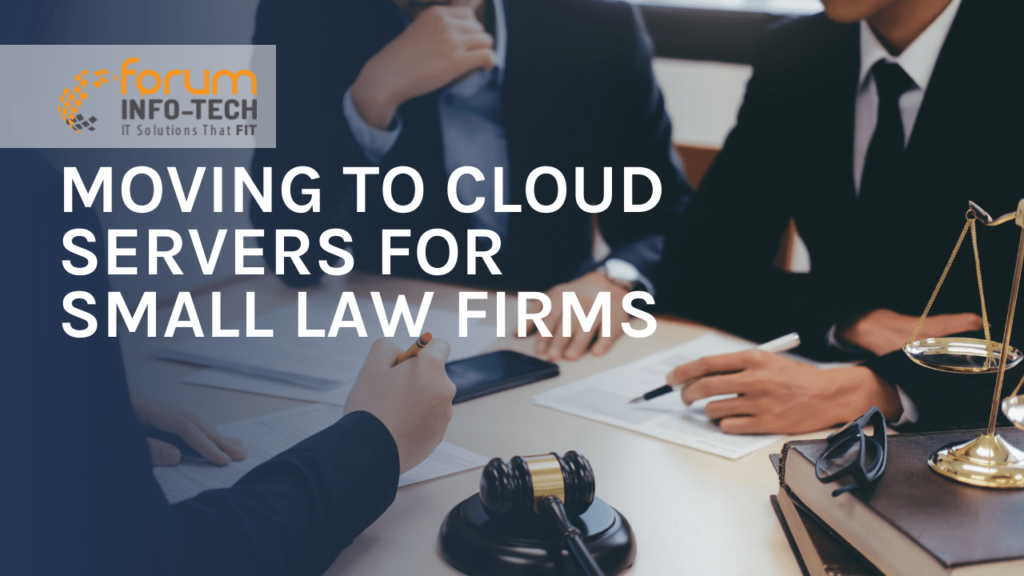Recently, more and more firms have shifted to cloud computing, but law firms have been more hesitant to adopt this new trend. The main concern that most law firms, particularly small ones have, is cybersecurity. If clients’ data is available on the cloud, then it is perceived to be vulnerable to hackers and other cybercriminals.
However, thanks to huge advances in cybersecurity, law firms no longer have to worry so much about data vulnerabilities. Also, cloud computing can lead to massive increases in efficiency and access to lots of new clients. Still, moving to the cloud is not an easy task for a small law firm.
In the course of this article, we’ll be taking a look at several aspects of moving to the cloud servers for small law firms. We’re going to examine the advantages and disadvantages of moving to the cloud, how a small law firm can go about moving to the cloud, and more. But let’s start with the basics first.
What are Cloud Servers?
A cloud server allows you access to cloud computing. In conventional computing, data is stored on physical hard drives on a computer. But in cloud computing, the data is stored on the internet. However, storing and accessing data is just one part of cloud computing. With cloud computing, your law firm can have access to hardware services and software services from a third party through the internet.
Why Should a Law Firm Move to Cloud Servers

There are several very good reasons to move your law firm to the cloud. Let’s take a look at them one by one.
1. Better Data Backup
If your data is stored on an internal server and the internal server is compromised, then it is vulnerable. If there is some physical damage to the server, or if there’s a data breach, then files can be lost.
But if your data is on the cloud, then the data is stored in multiple locations. There is a primary server that holds the files, and there’s a secondary server that acts as a backup. So, there is less risk of files being lost due to data corruption or other factors.
If files are at less risk of loss or corruption, then that means there is less downtime in the event of a problem. Less downtime means increased efficiency for your law firm.
2. Saving Money
Using internal servers means additional costs, which can be a big drain on your budget, particularly if you’re a small law firm. Having local data storage is expensive, and maintaining the internal servers also has a high cost. But by moving to the cloud, you can save these expenses.
Expanding your law firm’s business is also very costly if you rely on local data storage. If your firm intends to expand, then you will have to spend money on additional hardware and IT personnel. So, scalability is a big problem if you want to keep data storage in-house. But moving to the cloud eliminates these expenses and allows you to grow your business freely.
3. Increased Efficiency
The cloud allows your law firm to get difficult day-to-day tasks done faster and easier. The tedious tasks that become more efficient on the cloud include – writing legal documents, generating invoices, and managing files. All of these tasks become more automated and much more convenient.
You can also access your data and relevant files from anywhere if you’re on the cloud.
Why Moving to the Cloud May be a Problem for Law Firms

Along with all the positives that come with moving your firm to the cloud, there are a few downsides that need to be addressed.
1. Concerns About Cybersecurity
The confidentiality of client data is very important for law firms. Law firms are under considerable scrutiny to ensure that this confidentiality is not compromised. Moving to the cloud is seen to be dangerous by most law firms, but the truth is that the cloud can actually be more secure than local data storage, especially if your law firm is a small one and doesn’t have top cybersecurity.
2. Difficulties in Switching to the Cloud
Transferring all data from local storage onto the cloud is not easy. Many law firms balk at the prospect of so much downtime and the difficulties of moving to the cloud. But although moving to the cloud is difficult, in the long run, it will make your business more efficient and effective.
Easing the Process of Shifting to Cloud Servers
Keeping in mind the genuine difficulties of shifting to the cloud, there are several ways in which a law firm can ease the transition. Before moving to the cloud, a law firm needs to have two separate and well-defined strategies in place.
First, a law firm needs to have a good business-cloud strategy. Second, a law firm needs to have a good cloud implementation plan. Let’s take a look at both of these strategies in greater detail.
Business-Cloud Strategy
Moving to the cloud is a huge step for any firm. A business-cloud strategy is a justification for moving your law firm to the cloud. Moving to the cloud is going to be expensive, and workflows are going to be radically altered. So before taking this huge step, it’s important to consider very carefully by making a strong business-cloud strategy.
Try to determine what has been keeping your law firm back and where you would like to see your law firm in the future.
Cloud Implementation Plan
Once you’ve created a good business-cloud strategy, it will make it easier to make the cloud implementation plan as all the reasons to move to the cloud will be well-defined and clear. A cloud implementation plan is also called a cloud roadmap.
There are lots of details that need to be determined in the cloud implementation plan. The plan will include specifics of system inventory, what kind of cloud environment is required by the firm, what are performance baselines will be best-suited to the firm, the migration strategy, cybersecurity requirements, and expenses/costs of the whole process.
Why a Small Law Firm is Easier to Move to Cloud Servers

Small law firms have fewer clients and fewer decision-makers, so it’s easier for them to move to the cloud. The transition to the cloud is less problematic, and the opportunity cost is also much lower. What does this mean in practical terms? Smaller firms can take advantage of all that a cloud has to offer without having to worry about compatibility issues or dealing with an IT team that may not be well versed in the needs of small businesses.
Moving to the cloud makes perfect sense for small law firms. It’s a cost-effective way to get the power and flexibility you need to run your business without sacrificing security or reliability. Plus, it’s an excellent way to future-proof your firm as technology advances. If you’re on the fence about making the switch, now is definitely the time to do it.
Cloud-based law practice management systems are constantly evolving to keep up with the ever-changing world of technology.
The Risks of Moving to the Cloud for Small Law Firms

Most online services that are readily available have public clouds. The upside to using a public cloud is that it is cheap, but the downside is that it can be less secure. The alternative to using a public cloud is to have a personal, private cloud that is exclusive to your law firm.
But the problem is that even though a private cloud will be more secure, it’s also going to be much more expensive, initially. So having a private cloud is simply not practical if your law firm is a small one, you will have to use a public cloud service if you want to stay within budget.
Before you sign up with a cloud service provider, you need to assess them very carefully. Make sure that the service provider has a good reputation and is a well-established one. You should ask whether the data storage is encrypted or not and which encryption methods are used to protect the data. Also, make sure to ask which hardware security modules are used by the service.
You also need to ensure that the cloud service provider has secondary security features. Two-factor authentication is a must if you plan to allow employees to access data outside the company offices.
Another thing that you need to ensure is that you do not violate any laws by outsourcing to a cloud service. The Solicitors Regulation Authority (SRA) governs the practices of law firms, so you have to make sure that using a cloud service provider doesn’t violate any of the SRA’s regulations.
Business Practices Small Firms Need to Implement to be Secure on Cloud Servers

1. Educate All Employees About Data Security
If you move onto cloud servers, then most business practices will be conducted on the cloud. In law firms, confidential data is handled by not just attorneys but also other employees. Secretaries, administrators, accountants, and paralegals, will all be handling the data.
All of these employees need to be aware of the risks of cloud computing and what steps need to be taken to ensure that data remains secure on the cloud. If even a single employee doesn’t take proper security precautions, the law firm’s entire data could be at risk.
Forum Info-Tech does a great job of educating clients to pass on information and training to all end-users.
2. Foil Phishing Attacks
Phishing is the most common way that hackers can gain access to confidential data. If you receive an email from an unknown source, you should not click on any links in the email as it could very well be a phishing attack. Everyone in the company needs to be informed about phishing attacks and how not to fall prey to them.
Forum Info-Tech offers phishing training for employees. You can learn more by going to the FIT Phishnet page by clicking here.
3. Incorporate Two-Factor Authentication
Make sure that whichever cloud services your law firm uses provide two-factor authentication. Two-factor authentication means that, in addition to entering a password, whenever an employee wants to log in, they have to enter a one-time code that is sent to their phones. The two-factor login ensures that it is almost impossible for hackers to gain access to sensitive data.
Partners of Forum Info-Tech offer 2-factor authentication to ensure secure logins for all end-users.
4. Protect On-Site Hardware
Any hardware that is used to access the law firm’s data needs to be well-protected. If any device in the firm’s offices is compromised, it could lead to confidential data being stolen. So, make sure that there are proper security safeguards in place to protect hardware in the firm’s offices.
Ensure that there are strict guidelines for all employees regarding how to use the firm’s devices to safeguard them from becoming vulnerable to any hacking attempts.
Forum Info-Tech offers on-site managed services. You can learn more by going to the Onsite Managed IT Support Services page.
5. Set Different User Privileges for Different Employees
All employees should not have access to all of the law firm’s sensitive data. Client data which is the most important should only be accessible by the attorneys. So, you need to create different security levels within the firm so that even if there is a security breach, all client data does not immediately become vulnerable.
Employees should only have access to data that is relevant to their area of expertise. By creating different levels of access, you can ensure that in the event of a security breach, less harm is done.
With the new FIT LevelCloud, you can have user priviledges set on and individual basis.
6. Create an Activity Log for the Cloud
An activity log ensures that every time that an employee logs onto the cloud, it is logged. Also, everything that the employee does while logged into the cloud is recorded. The benefit to having an activity log is that if there is a security breach, you can examine the log to find out how it happened and ensure that it doesn’t happen again.
Another advantage to having an activity log is that it increases accountability among your employees. If your employees know that everything they do is being recorded, then they will conduct their activities carefully and follow appropriate procedures diligently.
FIT Recon is our solution for activity log monitoring. You can learn more about this solution by going to the FIT Recon | User & Entity Behavior Analytics page.
Conclusion
Moving to cloud servers is a smart move for small law firms as it can have a number of benefits – cost-cutting, increased efficiency, and better data storage. The main reason that most law firms are hesitant about moving to the cloud is the perceived security risk. But thanks to improvements in cybersecurity, the cloud can actually provide stronger security than in-house data storage.
The second reason that law firms don’t switch to the cloud is that the process can be expensive and time-consuming. But if your law firm is small, then moving to the cloud is much easier. However, there are a few things that you need to take off if you move to cloud servers. All your employees need to be educated on how to work on the cloud properly. And you will also need to implement activity logs, 2-factor authentication, and different user privileges.
As long as all these steps are taken, working on the cloud will not cause any problems, and you’ll be able to enjoy all of the benefits of working on the cloud.

